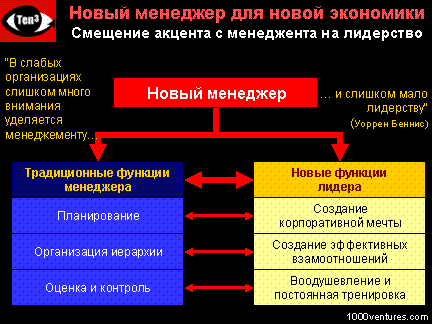|
Managerial Leadership |
|
by Vadim Kotelnikov, Founder, Ten3 Business e-Coach for High-Growth Firms, 1000ventures.com
"Leaders walk their talk; in true leaders, there is no gap between the theories they espouse and their practice" - Warren Bennis
|
The Essence of Managerial Leadership The genuine leader is someone who can express a vision and then get people to carry it out, said Jack Welch, the legendary former CEO of General Electric. Leadership versus Management Leadership is more than just having the authority of a management or supervisory position. Authority (or position power) gets you compliance. Leadership (or influence power) gets you commitment. "When you influence others to follow, they do so because they like you, admire you, stand in awe of you (referent power). Or because they believe you have special expertise to support their efforts (expert power)."7 Establishing a Purpose, Direction, and a Set of Goals "Regardless of how intensely or frequently knowledge workers might question the direction chosen, it remains the leader's job to define that direction and convey how it supports the fundamental purpose of the unit or organization2". Emotional Task of the Business Leader The best leaders have found effective ways to understand and improve the way they handle their own and their followers' emotions. Understanding the powerful role of emotions in the workspace will enable you to achieve better both tangible results such as higher profits and the retention of talents, and intangible ones, such as higher morale, motivation, and commitment. Integrity While leadership is always important to corporate performance, there is a growing realization that effective leaders with integrity are absolutely crucial to successfully navigating the New Economy of the 21st Century. In addition there is also a growing realization that the characteristics of the Leader of the 21st century are dramatically different than the leader of the past, even the recent past...More Building Sustainable Competitive Advantage You must focus your firms resources on what it does best and what creates sustainable competitive advantage. Continuously assess, redefine, and then secure core competencies that your firm must have to compete. The following are three main characteristics of your core competences:
Case in Point: 25 Lessons from Jack Welch While boosting productivity and getting results were of paramount importance to Jack Welch, the legendary former CEO of General Electric, how someone got a team to perform mattered more. He looked for managers who he felt had the four E's of leadership8:
|
|||||||||||||
Bibliography:
-
"Extreme Management", Mark Stevens, 2001
-
"Relentless Growth", Christopher Meyer, 1998
-
"Leading Change", James O'Toole, 1996
-
"Motivate to Win", Richard Denny
-
"Managerial Leadership", Peter A. Topping, 2002
-
"Leading on the Edge off Chaos", Emmet C. Murphy and Mark A. Murphy, 2003
-
"Test Your Leadership Skills", Brian O'Neil, 2000
-
"The Welch Way", Jeffrey A. Krames, 2002



